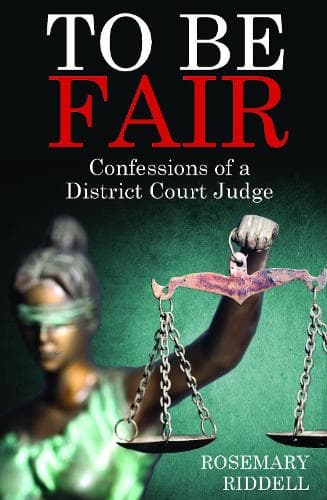Review: To Be Fair: Confessions of a District Court Judge
Reviewed by Dionne Christian
I started reading Rosemary Riddell’s memoir, To Be Fair, about her work as a New Zealand District Court and Family Court judge, to find an extract to run on Kete to complement the many reviews we run. Two hour later, I was more than halfway through the book, nodding my head and muttering to myself sentiments along the lines of, “so, that’s how that works,” while agreeing with many of Riddell’s quiet but nevertheless determined proclamations.
Modestly produced, Riddell’s book is insightful and (obviously) highly readable as she reveals a glimpse of what goes on behind-the-scenes of one of foundational pillars of the contemporary Western world. That said, the workings of the judiciary, partly by its own design, remain a mystery to many of us. In her final paragraphs Riddell writes of her own apprehensions about exposing too much about the institution: “Some might feel the mystique of being a judge should not be uncovered, or that judging, by its nature, is a serious business, diminished somewhat by poking the borax.”
But she also notes that she’s now 68 and “done with fear” and that all of us seem “broken and scared” – even those who appear to have it together. “Judges are only human. Maybe it is time to tell that story. And so, here it is.”
She recounts how heavily the responsibility of sentencing offenders, especially young ones, could weigh on her; the sympathy she felt for those unwittingly caught up in the criminal justice system by accident of birth.
“We all have a need to belong, to have a place we can call home, to love and be loved. Never mind climbing the ladder of success. Some never even find the ladder.”
There’s a quiet anger when she writes about institutional racism, poverty and social inequality, quoting former slave turned American statesman Frederick Douglas who said, “it is easier to build strong children than to repair broken men.” She despairs for the children of parents locked in bitter custody disputes: “Someone once said children are great imitators – so give them something great to imitate. Not tumult and turmoil.”
She’s critical of what she sees as laws that are obsolete or “just plain wrong” like the 1955 Adoption Act and legislation that allowed the uplift of newborns into Oranga Tamariki custody. Similarly, the so-called three strikes policy and those politicians, especially, who demand longer sentences – “line ‘em up and shoot ‘em” policies – in order to win votes. Longer sentences, she declares, won’t stop or even reduce crime. Instead, Riddell advocates for more restorative justice and greater attention – and resources - on the social issues and conditions which can foster the circumstances in which crime might appear to pay.
That Riddell underpinned her work with strong social justice beliefs is not surprising. After giving up dreams of being an actor, she studied while raising three children with husband Mike and qualified as a lawyer aged 40. At one point, she took time off to direct Mike’s award-winning film The Insatiable Moon inspired by his experiences of working with those with mental health issues.
But it’s not as earnest as it might sound. Riddell’s account is surprisingly humorous peppered with self-deprecating anecdotes like the time she mistook a psychiatrist for a patient during a mental health hearing or the witness who refused to state his name until everyone else in the court had introduced themselves. You can almost hear her shaking her head and sighing as she reflects on some of the more amusing things she’s seen and heard; likewise, you feel her heartbreak at the tragedy she’s witnessed.
That includes tragedy in her own life, such as the death of her daughter Polly who, at times, struggled with drug addiction. The chapter In Their Ivory Towers is a wake-up call to anyone who thinks all judges were born supping from a proverbial silver spoon into a life on easy street.
Reviewed by Dionne Christian
See in New Books
